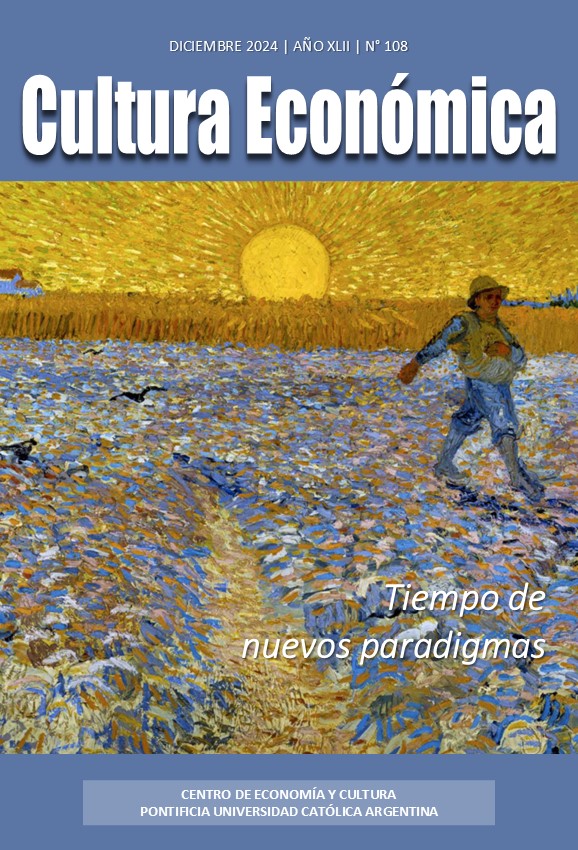¿Se puede obtener una rentabilidad ilimitada con la utilización de recursos limitados?
DOI:
https://doi.org/10.46553/cecon.42.108.2024.p112-124Palabras clave:
felicidad, placer, seguridad, competitividad, aprendizaje, libertad, ansiedad, conflictoResumen
El artículo “configura” una propuesta de interpelación permanente acerca de las causas –eventuales– y posibles consecuencias –medibles– de una conducta utilitarista, en el marco filosófico de la economía clásica, pero, a su vez moderna, especialmente en la búsqueda de un camino que “muestre” (y simbolice) herramientas de decisión, aparentemente de uso racional, de acuerdo con la creencia natural y ambiciones propias del ser humano. Pese a que él mismo presupone –tal vez adecuándose a lo que se considera racional, por definición– que los beneficios obtenidos, fruto de su propia conducta, pudieran parecer “siempre ilimitados”, argumento que, por cierto, es absolutamente irracional. Estas afirmaciones se sustentan en aquello que el hombre adopta como “compromiso ético”, aun cuando trata de separar la economía de la moral, pero, dado su comportamiento práctico o ejecutivo de acciones tendientes a buscar ventajas durante la mayor parte de su vida, bien podría quedar atrapado en la “búsqueda del placer material”, muchas veces en conflicto con su ética misma, o lo que la persona pregona como norma de ética.
Descargas
Citas
Arnal, M. (20 de marzo de 2021). Las cosas y sus nombres – origen de la palabra «Felicidad». El Almanaque. https://elalmanaque.com/Marzo21/20-3-21.htm
Arnaudo, F. (2002). Tres visiones del mundo: liberalismo, marxismo, socialcristianismo (2da ed.). Universitas.
Bell, D. et al. (1995). Las contradicciones culturales de la modernidad. Plaza & Janés.
Bellomo, S. (2009). ¿Adultos adolescentes? Paradojas en la era de Peter Pan (1ra ed.). Bonum.
Bourdieu, P. (2010). Las estructuras sociales de la economía (1ra ed., 4ta reimp.). Manantial.
Gómez, L. I. (2 de febrero de 2009). Maquiavelismo inconsciente, egoísmo evolucionado. Desde el exilio. http://www.desdeelexilio.com/2009/02/02/maquiavelismo-inconsciente-egoismo- evolucionado/
Gore, E. (2004). La educación en la empresa: aprendiendo en contextos organizativos (2da ed.). Granica.
Hidalgo Tuñón, A. (1978). El principio de racionalidad limitada de H. A. Simon y el Premio Nobel de Economía. El Basilisco, Núm. 4, 68-79.
Höffner, Cardenal J. (1997). Doctrina Social Cristiana. Ordo socialis.
Juan Pablo II (1987). Encíclica Sollicitudo Rei Socialis. https://www.vatican.va/content/john-paul-ii/es/encyclicals/documents/hf_jp-ii_enc_30121987_sollicitudo-rei-socialis.html
Febrero, R., & Schwartz, R. (Eds.) (1997). La esencia de Becker. Ariel Sociedad Anónima.
Lee, D. R. (s.f.). La economía del cuidar y del compartir. http://www.institutoacton.com.ar/comentarios/85com16-02-12-b.pdf
Leocata, F. (2010). Filosofía y ciencias humanas: hacia un nuevo diálogo interdisciplinario (1ra ed.). Educa.
Mirabella, M. (2006). Fundamentos de filosofía económica (2da ed.). Educa.
Rodríguez, S. (s.f.). Video completo «Comprar, tirar, comprar» de TVE. El portal de la economía solidaria. https://www.economiasolidaria.org/recursos/biblioteca-video-completo-comprar-tirar-comprar-de-tve/
Senge, P. M. (2006). The fifth discipline: The art & practice of the learning organization. Doubleday.
Vero et Ana (15 de mayo de 2011). ¡Emotivismo! http://anayveroemotivismo.blogspot.com.ar/
Zanotti, G. (s.f.). Economía para sacerdotes III : la propiedad. http://www.institutoacton.com.ar/comentarios/45artzanotti69.pdf
Descargas
Publicado
Cómo citar
Número
Sección
Licencia

Esta obra está bajo una licencia internacional Creative Commons Atribución-NoComercial-CompartirIgual 4.0.













